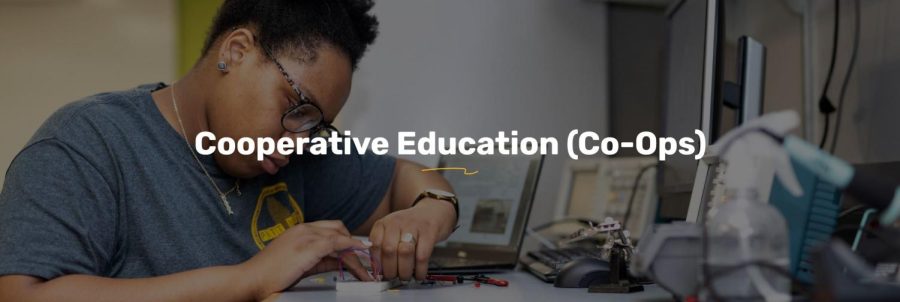Pitt’s co-op program gets re-engineered
March 2, 2022
For students in Pitt’s Swanson School of Engineering, learning takes place far beyond Benedum Hall. Whether they gain experience doing fieldwork for a company located on the other side of the country or joining in on meetings with potential future employers in Pittsburgh, the co-op program gives engineers an immersive introduction to their future careers.
The Cooperative Education, or co-op, program allows students to participate in both traditional education and full-time work related to their career path during their time as undergraduate students. The program typically includes either two six-month rotations or three four-month rotations, during which students in any engineering discipline take on a position at a company as a full-time employee, and devote their remaining terms to classes at Pitt.
Tyler Kimmel, an engineering and professional development consultant at Pitt, said Swanson’s co-op program has undergone significant changes during the past year. Swanson has implemented a new program on the online platform Symplicity to make the co-op search process more accessible.
“We [recently] rolled out our new Symplicity platform, SSOE Select,” Kimmel said. “This new recruiting element is the engineering student’s one-stop-shop during their co-op and internship search. Job postings, career fairs, information sessions, documents, etc. can all be found here.”
With a simpler co-op selection process than ever before, Kimmel also said students have been able to work at companies far beyond Pittsburgh.
“Students can work almost anywhere and we have students all across the country,” Kimmel said. “They’ve had great work experiences for employers big and small and across a variety of industries.”
One student currently participating in the co-op program is Claire Gendron, a sophomore environmental engineering major. Gendron works full-time at Tetra Tech, a Pittsburgh-based company that focuses on creating sustainable technology and infrastructure. Besides this semester, Gendron will also work at Tetra Tech during both the fall 2022 and summer 2023 terms.
Gendron said her co-op experience provides an invaluable opportunity to learn about the different career paths she could pursue after earning her degree.
“I’ve only been there for about seven weeks, and I’ve already been involved in so many different things,” Gendron said. “They have me doing a lot, and it’s really nice because I don’t know exactly where I want to go with my degree and my career.”
Besides making tables and performing assistive tasks to help move major projects along, Gendron said she gets the opportunity to participate in fieldwork, giving her a closer look at the data she typically works with.
“The first six weeks were all in my office at my cubicle, but they wanted to put me in the field just so I could experience that … I’m helping take groundwater samples,” Gendron said. “It’s raining, it’s cold and not what I thought I signed up for in this co-op, but I’m so glad they put me on this project and are allowing me to do this.”
Despite efforts to increase accessibility within the co-op program, many students still find themselves unable to take full advantage of the opportunities provided through the University. Though Pitt has relationships with companies located all across the country, it is not always logistically possible for students to work outside of the Steel City.
Shreyo Das, a sophomore mechanical engineering major, received an offer for a position at Michigan-based furniture company Herman Miller. But because Das does not own his own vehicle, it would be very tough for him to get to and from work every day.
“[Between] where they’re offering me to stay and where I’m supposed to go into work, there’s a 40-minute commute,” Das said. “It’s significant enough to where I need to be able to use highways … and so while they haven’t officially said ‘no’ yet, I think there’s good reason to believe that this opportunity will not proceed any further for me.”
Although Das is facing major challenges, he plans to apply to other companies. Das said he recognizes that, regardless of transportation issues or other concerns that may arise, a virtual or hybrid co-op, which is still an option, may be the best option for him, but he would still prefer an in-person option.
“[A virtual option] would let me work, that’s for sure. It would objectively take me out of the situation I’m in, [but] there’s definitely something to be said about the personability of going into the office,” Das said.
Kristal Cheshire, program administrator at Swanson’s Office of Experiential Learning and Professional Engagement, said many co-op positions remain unfulfilled due to students showing less willingness to commit to a long-term position, even as the COVID-19 pandemic subsides.
“As far as engineering students, the numbers seem to be down … Students seem reluctant to commit, and positions remain unfilled,” Cheshire said.
Gendron said she and her peers are still gaining immense benefits from their participation in the program compared to traditional internships.
“What I found to be the biggest difference is the commitment you’re making with a co-op,” Gendron said. “With an internship, you go and you hate it, or you realize this is what you want to do. It’s one summer and you’re done. With a co-op, you’re signing on for two or three rotations, so that makes it even more important when you’re interviewing to ask the right questions and make sure you understand the company culture, a day in the life, and everything that will come with it.”



